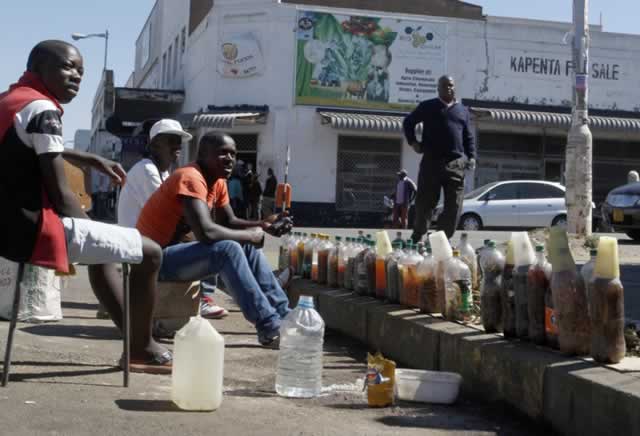Traditional medicine comes to town


Sangomas come to town. . . Traditional medicine vendors enjoy brisk business at the corner of Sam Nujoma and South Avenue in Harare
Fortious Nhambura Senior Features Writer
Traditional medicines — charms and portions and concoctions — pretty much used to be the kind of things many urbanites would have to visit sangomas in the rural areas or some odd suburbs to get, usually under cover of darkness.
In urban areas, council-designated market places would be the places to go and this would take one to markets such as Mupedzanhamo, Mbare Market and Mukambo in Machipisa where fetish-looking bottles, clay-pots, beads and other paraphernalia would announce the other world of “dark medicine”.
It goes without mentioning, too, that the practitioners, usually wizened and cryptic looking, would add to the numinous air around the trade. Traditional medicines have lately come to town, though. That is, without the mysticism and rudimentariness alluded to above — but with the openness of any other vendor in town. It is now commonplace to find men and women displaying their wares on pavements along streets in Harare’s CBD, including the First Street Mall.
Yes, the good old First Street!
In a typical scenario, Mushore, a herbalist operating at the corner of Sam Nujoma Street and South Avenue, in the morning busies himself stacking jars of traditional medicines on the pavement.
He ensures that the clear sides of the two-litre plastic bottle faces the pavement so that the pedestrians going about their business can have a glance.
To get the passers-by attention, Mushore rhythmically advertises his herbs as: “Jeko rese regono, gadzi, siki dzedrop, ruva, vane TB, BP, cancer kana AIDS, vakatsva maFuse, vanoda majumpers, vano fire mablanks kana kurwadziwa nemusana mose huyai pano.”
The traditional herbs are prescribed either as leaves, roots or powders. One thing for sure is that the herbalists claim their herbs can cure all kinds of ailments. They have a concoction for “any condition.”
They have herbs for good luck, employment and disease charms targeting those battling cancer, stomach aches and sometimes HIV.
“Here we treat all disease including those that cannot be treated with modern medicine. We specialise on all those ailments. Our doses start at as low as US$2 and, I tell you, they are effective. Ask anyone who has been here and they will tell you that these herbs are the best.”
As we talk, a middle-aged man comes to buy a cupful of the stuff and without thinking sends it down the throat in two gulps with a grin. “He is one of our regulars. He takes his doses here for some ailment that I will not disclose to you. Just bring your sick relative and see that the herbs are effective. I operate from this place everyday Monday to Saturday save for Sundays. This is my surgery and anyone who wants my services should come here,” he declares.
What makes them wake up every day and risk being arrested by municipal police?
Business must be brisk.
A vendor along First Street who refused to be named said she gets the herbs from a sangoma based in Mutare, Sekuru Mparan’anga (Noah Jairos)
“We are only contracted to sell the herbs on commission. Sekuru does the packing and labelling and our duty is only to sell the herbs to people. These herbs range from increasing sperm count to strengthening the backbone and treatment for ulcers. Sekuru brings the herbs and gives us instructions on how they are used.
“All the herbs I am selling are effective. No one has come to me with complaints. Only yesterday (Friday) I sold “dambarefu” to some man and today he brought two friends and bought herbs for US$6. People are coming requiring more. Each sachet costs US$2 and I make as much as US$20 a day and more on a good day,” she said.
She said Sekuru Mparan’anga had contracted many people to sell the herbs for him.
“We are a team of 12 vendors operating in Harare and get getting the drugs from the same individual. One is selling at Market Square, two along Baines Avenue, one at Copa Cabana, another is at South Avenue and the other one at Fife Street Shopping Centre. Sekuru also supplies other vendors in Mutare.
“I have never heard of any side effects. I have been selling these herbs for over a month and half and I am still to get any complaints,” she said.
Documents seen by The Herald show that Sekuru Mparan’anga is registered with the Traditional Medicines Practitioners Council.
Another herbalist operating at Fife Avenue Shopping Centre who only identified himself as Sam said he was actually earning a living without resorting to crime.
“There are no jobs in the industry and this is how we can fend for the family. I am happy there is a market. We are surviving on selling these herbs because many people now prefer traditional herbs than modern medicines considering the cost of consulting a doctor and the known side effects of some of the drugs,” Sam said.
But the Zimbabwe National Practitioners Association president Mr Friday Chisanyu said what the herbalists were doing was outside the law but as associations they were unable to prevent that herbalist from practising. ZNPA is an association of traditional healers.
“We are aware of the proliferation of these so-called street herbalists but there is nothing we can do. As you know the police have the final authority for stopping those who break the law and we appeal to them to enforce the law.
“The Traditional Medical Practitioners Council of Zimbabwe code of ethics makes it mandatory for herbalists or traditional doctors to operate with a license and from a properly registered premise as specified in their license. These people are operating outside the law and patients have no right to recourse,” he said.
The code of ethics which is administered by the Ministry of Health and Child Care makes it an offence to hold matare (consultations) or operate a herbal pharmacy and or clinic in an unregistered property for herbalist.
They are directed to ensure that the building is a clean and tidy environment with property clearly demarcated, and to notify change of address to the TMP Council within three months.
The herbalist and traditional healers are also supposed to comply with regulations laid down by Medical Control Authority of Zimbabwe as regards dispensing and labelling of their medicines.
The MCAZ mandates all medicines to be clearly labeled, specifying dosage, name and address of the patients and date when the medicine was dispensed.
Practitioners are supposed to operate strictly within an area of competence for which they are registered by the TMP Council.
Mr Chisanyu said at the moment the ministry was only able to regulate practice and not the product hence is not in a position to fully enforce the law in relation to implementation of the proper practice of traditional healer and herbalists.
He said the people consulting street healers and herbalists were exposing themselves to danger as they cannot get recourse in the event that they were injured.
MCAZ spokesperson Richard Rukwata said herbal medicines were recognised under the Medicines and Allied Substances Control Act (Chapter 15:03), to the same extent that other western type (allopathic) medicines are recognised and hence should be sold from approved premises and not on the streets.
“Further, herbal medicines must be approved by the MCAZ prior to being sold. We periodically team up with the police to stop such practices, which are blatantly illegal, however, the main difficulty we face is that there are too many of these peddlers spread around a number of locations.
“So what usually happens is that when a sting operation is undertaken, word spreads quickly and they quickly disperse. Section 50 of the Medicines and Allied Substances Control Act (S.I. 150 of 1991) specifically states the following: “No person shall sell any medicine unless the sale is effected on premises — (a) licensed in terms of Part V1 of the Act; or (b) authorised in terms of these regulations; (c) authorised by a general dealer’s licence issued in terms of the Shop Licences Act. [Chapter 14:17].
“This provision empowers any police officer to actually arrest anyone peddling medicines on the streets, and we encourage all police officers to do so because this is an inherently dangerous practice that exposes the public to innumerable dangers since there is no way of ascertaining the contents of these herbal products, some of which may be extremely dangerous to their health,” he said.









Comments